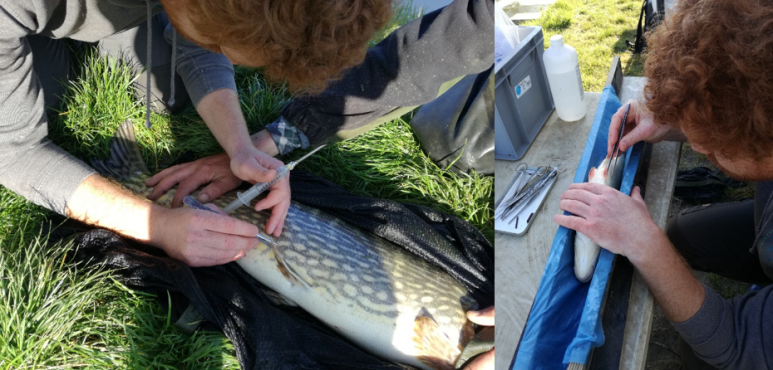My RIBES story: Jelger Elings
I’m Jelger Elings and in October 2020 I started as an Early Stage Researcher within the RIBES project. I’m stationed at Ghent University and INBO, the Flemish Research Institute Forest and Nature. During this project I’m supervised by Peter Goethals, Stijn Bruneel, and Ine Pauwels. The RIBES project is focused on looking at human impacts on river systems and how to mitigate ecological problems that arise from these impacts. My part of this project is focused on fish behaviour in the vicinity of hydropower installations and the accompanying fishways.
I have always been interested in ecology and how human actions impact natural systems but also in how human society can benefit from natural ecosystems. So when I started looking for a university program to follow and found the study Forest and Nature Conservation offered by Wageningen University the choice was easily made. At Wageningen University I followed the Bsc and Msc program of Forest and Nature Conservation. At this point my interest in fish did not really extend beyond the salmon that was served for dinner. Nonetheless I felt something was missing from my education. The program I followed so far was quite focussed on terrestrial ecology whereas the Netherlands also contains a lot of aquatic nature. This led me to the study of Aquaculture and Marine Resources Management allowing me to learn about aquatic ecology without missing out on the practical applications of that knowledge.
 Jelger Elings working on macro-invertebrate sampling in a Dutch side-channel (left) and fish larvae sampling on the Markerwadden (right).
Jelger Elings working on macro-invertebrate sampling in a Dutch side-channel (left) and fish larvae sampling on the Markerwadden (right).
During the program of Aquaculture and Marine Resource Management I’ve gotten my first experiences with fish research. During my thesis I’ve been involved with researching the nursery function of side-channels constructed along the Dutch rivers and my internship was focussed on a similar subject in a newly constructed nature reserve called the ‘Markerwadden’.
 Jelger Elings inserting a PIT-tag in a Pike (Esox lucius) and a VEMCO acoustic tag in a Chub (Squalius cephaclus) for our pilot study in Rotselaar.
Jelger Elings inserting a PIT-tag in a Pike (Esox lucius) and a VEMCO acoustic tag in a Chub (Squalius cephaclus) for our pilot study in Rotselaar.
In the past few months I have mainly been working on writing a review and getting my license for animal testing. In the meantime spring has started, which means that fieldwork has begun. In the village of Rotselaar we are conducting a pilot study. With this study we aim to get an initial understanding of fish behaviour in the vicinity of a hydropower plant and how fish use different ‘navigation cues’ like water flow to orient themselves towards a fishway entrance. So far we have caught and tagged Pike, Roach, Chub, Lamprey, and Catfish. In the following months we will be collecting our data and, if everything v is successful, a larger study will be carried out next year. Additionally I am really looking forward to cooperating with the other ESR’s. Combining efforts with such an interdisciplinary team will really have an added value. For example,cooperating with ESR’s conducting lab experiments can give me crucial insights into how fish behave in the wild based on behaviour we see in controlled lab settings.
